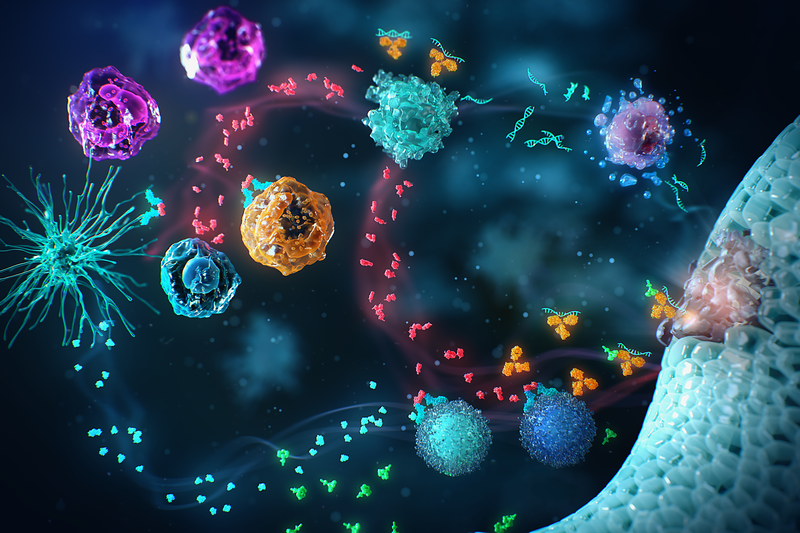
Taking an immunology-led approach to cancer
I have been fascinated by lymphoid anatomy for many years – the complexity of the human immune system makes it an incredibly interesting, yet challenging area of research. As we learn more and more about how the immune system targets disease, we're recognizing just how important immunity is in the fight against cancer. Indeed, the first wave of immuno-oncology (IO) therapies have had a huge impact on how we approach cancer treatment,1 but not all patients respond fully.
We need an even greater understanding of the interplay between cancer and the immune system, and how genetics, epigenetics and antigenicity impact the anti-tumor immune response, to inform new therapeutic approaches.
Here, I reflect on the challenges facing the scientific community, focusing on three factors which determine the anti-tumor immune response:
1. Antigenicity determines the potential for a tumor to respond to IO therapy: We know that tumor-specific antigens (neo-antigens) allow the immune system to recognize and attack tumors. Finding new ways to activate immune cells to recognize neo-antigens is a key part of our IO strategy. For example, one avenue of our research focuses on T cell engagers, bispecific antibodies which create an artificial synapse between T cells and cancer cells. This is a really neat concept, as it allows us to tap into the vast pool of resting T cells already present in the body, and redirect them to the tumor.
2. Tumor immune composition influences the anti-tumor response: We know that T cell expression in tumors is associated with response to IO therapy,2 and new scientific insights are revealing the importance of other immune populations such as natural killer (NK) and myeloid cells. Having knowledge of a tumor’s immune composition is critical for understanding which therapeutic approach may be most effective against that tumor. We are carrying out extensive studies of immune cell populations, which are increasingly important for informing future treatment strategies and understanding why different cancers have varying response rates to IO therapies.

3. The tumor microenvironment must be made conducive for attack: Even when appropriate neo-antigens and immune cells are present, tumor-related factors can suppress the immune system, confounding the recognition of cancer. For example, a tumor may mimic the immune profile present at the placenta during pregnancy. Doing so, a tumor can hijack its immune-privileged signals and evade immune system attack.3 We are continuing to research the methods tumors use to imitate this ‘non-self inside self’ state, so we can overcome their defence mechanisms.
Through our research at AstraZeneca, we aim to better understand the nature of tumors, including antigen presentation, the immune cell profile, and how the tumor microenvironment regulates immune–tumor interactions to conceal aberrant cell growth from the wider immune system.
Addressing future challenges in IO
As we learn more about the immune system, we want to move the field of IO beyond immune checkpoint inhibitors and T cells. In doing so, we want to create a new conceptual framework for cancer research.
Our ongoing exploration of immunity in cancer will allow us to address two goals:
· To explore new ways to ‘switch on’ tumors that currently present few or no antigens, amplifying the body’s ability to engage with them
· To find tumors which are undetectable by the immune system and make them vulnerable to immune-mediated attack.
This reflects a paradigm shift, from looking at cancer in isolation to examining the whole, complex, nuanced human immune system. I am an immunologist by training, and I am passionate about the subject. So, it is no surprise that the immune system is now at the core of our thinking; we are taking an immunology-led approach to cancer.
I look forward to using this framework to inform and expand our exciting pipeline, and deliver on our broader ambition of delivering transformative therapies to treat a range of cancers.
References
Saez-Ibañez AR, et al. Nat Rev Drug Disc. 2022;21:631-632.
Vareki S. J Immunotherapy Cancer. 2018; 6:157.
Colucci F, et al. Science.2019; 365(6456):862-863.
Veeva ID: Z4-53183
Market Development Manager at HQ Science Ltd.
1moMark, thanks for sharing!
Scientific Event Organizers
4moDear Dr.Mark Cobbold Hope you are doing well! We would like to welcome you to participate at the “3rd International Conference on Cancer and Immunology” to be held from Sep 02 - 04, 2024 in Madrid, Spain. Click here to visit the conference website: https://rb.gy/tufxqh Looking forward to your positive response If you have any queries, Please feel free to contact us We are happy to assist you Thanks and Regards, MomentEra
Scientific Event Organizers
4moDear Dr.Mark Cobbold, Hope you are doing well! We would like to welcome you to participate at the “3rd International Conference on Cancer and Immunology” to be held from Sep 02 - 04, 2024 in Madrid, Spain. Click here to visit the conference website: https://rb.gy/tufxqh Looking forward to your positive response If you have any queries, Please feel free to contact us We are happy to assist you Thanks and Regards, MomentEra
Principal at Jenkins, Taylor & Hunt
6moLooking forward to reading these.
Co-Founder & Director at Reagene Innovations Pvt Ltd
6moThe best way to study this is to develop in vitro 3D human "disease-in-a-dish' vascular models with established tumor microenvironment communications and identify critical pathways of genetic and epigenetic interactions. We have already developed vascular models od lung and are developing other in vitro models of rheumatoid arthritis, immuno oncology models.